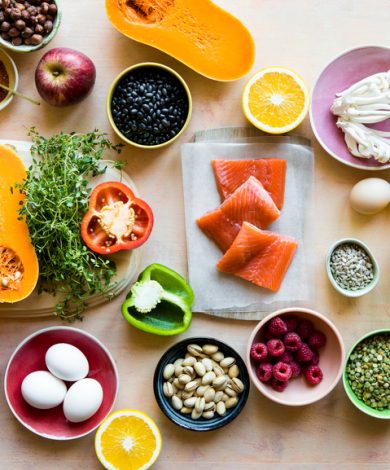As a soon-to-be new mom, I’ve been in full-on planning mode. For birth, of course.…
Mindset
Postpartum Burnout is a Real Thing. 6 Tips On How To Make a Full Recovery.
October 4, 2021 • By Gaby Cabrera-Kimchi

Within two days of my daughter’s birth reality hit. Like most new moms-to-be, I put all my energy into having a perfect pregnancy and birth and did very little to prepare for postpartum and motherhood. This left me reeling from a few immediate challenges:
One, breastfeeding. I developed mastitis and after two rounds of antibiotics, switched to formula. I knew this was the right decision for me, but I still felt like an absolute failure. Every mom I knew was able to breastfeed easily except for me.
Second, all of the big feelings. I developed severe anxiety and feelings of unworthiness. My mind was consumed with guilt, shame, and not being good enough. And I didn’t share it with anyone.
No matter where I was and how good things were with my baby and my family, my pervasive feelings and perceived stress ate away at me silently. And they triggered a cascade of seemingly random, unrelated symptoms.
I developed severe allergies, got every bug in the winter, had bouts of IBS, and my skin broke out worse than in my high school years. I experienced headaches, joint pain, and numbness in my extremities. Which all started with brain fog and extreme fatigue.
Normal symptoms of motherhood, right?
After many fruitless doctor visits, every specialist claimed I was clinically fine. Without a diagnosis of any kind, the anxiety and confusion and frustration I felt only grew from there.
Why wasn’t my body cooperating? I was eating clean, organic food. Wasn’t that the key? What could I possibly be missing?
Out of frustration, I signed up to train as an integrative nutrition health coach. And thankfully, that was where I had my ah-ha moment.
Turns out, the “random” and “unrelated” symptoms were typical of a dysregulated HPA-axis common in adrenal fatigue which had progressed to full-blown burnout. My body was stuck in freeze mode and my nervous system was completely out of whack.
Burnout is a mind-body syndrome which affects every aspect of our human experience. Some even call it a crisis of the soul and I would certainly agree with that! The root cause, which never came up in my many doctor visits, was emotional stress.
Regardless of whether stress is physical, emotional, or psychological, the physiological response releases biochemicals that affect every cell in our bodies preparing us to fight, flee, or freeze. When this response is chronically switched on, it wears the body down leading to premature aging, chronic illnesses, hormone dysregulation, and so much more.
Helping your body modulate a healthy stress response after burnout takes patience and a comprehensive approach. In my case, although my eating was flawless (my nutritionist’s words not mine), my emotional health and connection to myself were non-existent.
I realized that health is not just about what’s on your plact. It’s also how you think, move, rest, and connect to yourself and others. And it takes a holistic approach for your whole body to work synergistically in order for you to thrive.
After two years of healing intentionally, I am now symptom-free. I’m also healthier and happier than I ever was before. And my focus has turned to nourishing my natural rhythms to support homeostasis and let my body do its job: regenerate and self heal!
If you’re someone who feels stuck in a similar cycle or health struggle, I see you. Here are 6 things I found to be most supportive and impactful in my recovery from burnout.
Nutrition
Stress impacts our digestion, weakens our gastro-intestinal barrier, increases risk of leaky gut and autoimmune complications, and it compromises absorption of nutrients. It’s a lot. That’s why calming your gut and repairing it through nutrient-dense, whole-foods is key to your recovery.
That looks like:
- Avoiding processed and inflammatory foods, which is the most straightforward way to support yourself and your gut.
- Eating balanced meals regularly that include protein, healthy fats, and fiber to help regulate blood sugar levels as dysregulation aggravates the stress load.
Repairing the gut also helps to improve the mental and emotional symptoms of burnout through the gut-brain connection. Read more about how food can support your mental health here.
Connect With Your Body
To be honest, I don’t know if I had a connection to my body prior to burnout. I’ve found this to be true for most women. Research shows it may be behind our higher rates of depression and anxiety compared to men.*
Learning about our infradian rhythm teaches us how to support our hormone levels throughout the month in relation to our menstrual cycle. Living in sync with my cycle was a game changer for me. It helped me stop fighting my body and it’s natural rhythm and empowered me to develop a routine for work, play, rest, and nutrition that supports my physiology.
This also made my PMS go away – for good!
I also ditched the ‘no pain, no gain mindset’ and instead opted for low-impact activities
like yoga, pilates, rolling, rebounding, and walking. I moved toward movement that helps decompress the fascia, melt tension, and improve interoception (awareness of our bodies’
internal state).
And I did this all in sync with my menstrual cycle in order to honor my body’s needs for rest.
Rest
Rest is more than sleeping 8 hours a night. Although that is certainly a good start! It’s also important to synchronize our circadian rhythms by getting exposure to natural light during the day and avoiding blue light at night. Yes, this means spending less time on your phone, especially in the evening.
A regular practice of optimizing rest is essential for our body to heal and regenerate. Our bodies are designed to spend more time in the parasympathetic rest and digest state, but our modern lives have us running on stress hormones 24/7.
Rest can look like meditation, breathwork, lying down, legs up the wall, or a cooling yoga practice.
Sleep is still important and if you’re looking for support in maximizing the quality of your sleep, click here.
Self Awareness
When I realized that stress is not what happens to me, but how I react, everything changed.
I now have agency over something I previously thought I had no control over. I got curious about my go-to physical, emotional, and psychological stress responses.
I got to know my triggers and what helps me reduce my stress response. Armed with this knowledge, I am able to mitigate the effect of stress in my daily routine.
Did you know that 95% of thoughts are unconscious? These include the stories we tell ourselves that keep us stuck in the stress cycle.
Creating space between our thoughts and ourselves gives us space to not be defined by these stories. And notice what is true and what is something that’s been imposed on us externally.
Boundaries
Start saying “No” to others and “Yes” to yourself. Distance yourself self from things
and people that drain you. You only have so much energy in a day, how do you want to utilize what you have?
Take inventory of your daily activities and how they align with your values.
Ask for help. This is really hard for us recovering perfectionists, but it is so important.
This quote from author Rachel Macy Stafford has become my mantra: “I risk the safety of my inner world every time I pretend that I have everything under control when I’m really falling apart.”
Build a mom community
Human beings developed as a species through community. It is in our DNA. Having friends in the same stage of life helped to melt the shame from mom-guilt gone awry. And be open to the fact that different stages of motherhood require different types of friendships which you can read more about here.
This list is by no means conclusive or stationary; a beautiful reminder of the nature of life
itself. When you take time to create more balance, increase self-awareness and
reconnect to your body, your mindset shifts and how you relate to yourself and others
becomes easier.
Life will still happen and there will be countless things that you cannot control. The difference will be in the meaning you give to situations and the freedom to choose your reaction.
In a way, thanks to burnout, I found myself again which was what had been missing all
along. This inner-knowing helped me to show up as a better mom and find my calling as an
advocate of women’s health through my work empowering fellow moms to learn ways to
integrate family, work, and life without compromising their wellbeing.
You do not have to sacrifice your health to be a good mom. All you have to do is commit to staying curious and present, moment to moment. And cut yourself some slack, perfect moms do not exist!
Sources:



